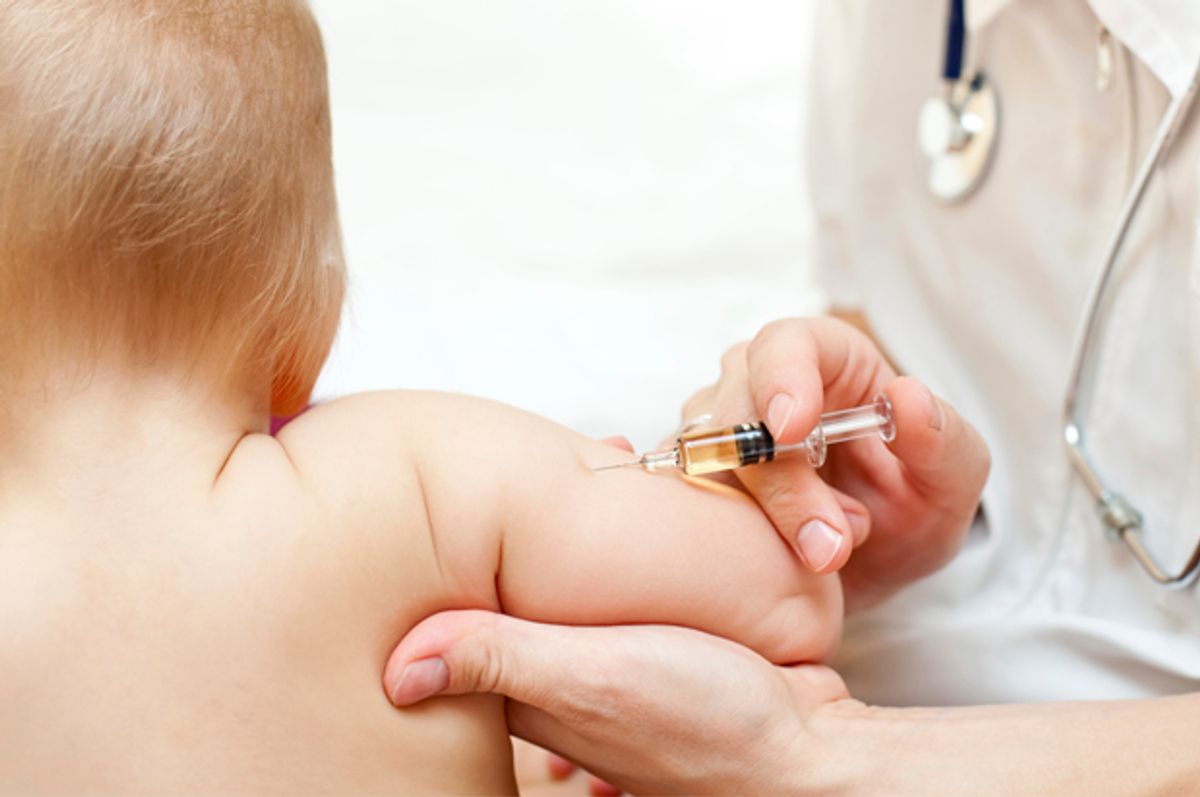This could be the report that finally, finally puts to rest the unfounded yet persistent myth that there's a link between routine childhood vaccinations and autism. Then again, knowing the tenacious nature of the conspiracy theorists determined to fight for their right to immunize their kids, naaah.
Still, the news Tuesday from the Journal of American Medicine might help sway a few parents still on the fence about the safety and efficacy of vaccinations. In a study of 95,727 children with older siblings — including children whose older siblings had autism spectrum disorders — "Receipt of the MMR [measles, mumps, rubella] vaccine was not associated with increased risk of ASD, regardless of whether older siblings had ASD. These findings indicate no harmful association between MMR vaccine receipt and ASD even among children already at higher risk for ASD." So can we at least start to move on from these groundless and harmful fears now?
There was once a moment in history, when if you were fortunate enough to have produced offspring after the development of some very basic vaccines, you took your baby to the pediatrician on a set schedule and your baby got the shots and then your baby got older and didn't get polio and stuff. That began to change in the late nineties, thanks in large part to Dr. Andrew Wakefield's famed — and now retracted — 1998 Lancet study purporting to link autism and the MMR vaccinations. In 2011, the British medical journal BMJ called the Wakefield study an "elaborate fraud." But when it first emerged, the Wakefield was closely timed to the 1999 FDA and CDC decision to move to replace the preservative thimerosal from vaccines as a precautionary measure — despite "no evidence of harm from the use of thimerosal as a vaccine preservative, other than local hypersensitivity reactions." In other words, on the one hand, you had a dubious report that other researchers were unable to duplicate. On another, you had a bunch of half-baked hype going around the Internet about mercury in your baby's vaccines. And then you had celebrities like Jenny McCarthy, former "Singled Out" host and "mother warrior" who, despite her more recent claims her very public skepticism about vaccines was just "desire for knowledge that could lead to options and alternate schedules," seems to have forgotten she's the one who said, "If you ask a parent of an autistic child if they want the measles or the autism, we will stand in line for the f_cking measles" and who told CNN, "Without a doubt in my mind I believe vaccinations triggered Evan’s autism." And so, the past few years have been quite a heady time for parents who just plain had a bad feeling about that big bad pharmaceutical industry to jump on the personal exemptions bandwagon, especially in places like California, where a measles outbreak earlier this year shed a bright light on the high rate of opting out. In 2014, 41 percent of Orange County’s kindergarteners were unvaccinated.
The latest JAMA report can now go alongside a pile of already solid supporting evidence for why children should be vaccinated. It can sit beside the assurances of the American Academy of Pediatrics and the World Health Organization. Yet even as evidence continues to mount that vaccines save lives and do not, I said do not, cause autism, plenty of people still don't buy it. The National Autism Association says it believes "Vaccinations can trigger or exacerbate autism in some, if not many, children, especially those who are genetically predisposed to immune, autoimmune or inflammatory conditions." And while Autism Speaks has just this past winter taken the firm and clearcut stance that "Vaccines do not cause autism. We urge that all children be fully vaccinated," it has also held that "It remains possible that, in rare cases, immunization may trigger the onset of autism symptoms in a child with an underlying medical or genetic condition." Autism Speaks also funds research on associations between autism and a wide range of nongenetic, or environmental, factors – including vaccination history." And in 2011, the organization was a sponsor of a National Autism Association event featuring Andrew Wakefield. Then there are the parents who, despite scientific data, just think their children are their property and they'll do with them what they please, with little to no understanding of the way that contagion works.
There is a leap of trust involved in taking your child into an office and letting someone plunge a needle full of mysterious substances into her arm that make her cry. I'm a mother; I get that. But responsible parenting means protecting not just our own children but all the children we possibly can, by fighting deadly diseases. That's the ethical and scientifically correct thing to do. If you don't believe me, please believe the results from the nearly 100,000 subjects of that JAMA study, and believe it when it says, "Lower vaccination levels threaten public health."



Shares